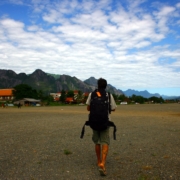Resilience: what, why and how

“More than education, more than experience, more than training, an individual’s level of resilience will determine who succeeds and who falls along the way. That’s true for cancer patients, it’s true for Olympic athletes, and it’s true for executives and entrepreneurs in the boardroom,” states Dean Becker in a 2002 Harvard Business Review article.
Resilience, therefore, is the ability to control your response to physically or mentally stressful situations. Science shows that the more resilient the individual is the further he will go in his personal and professional life. It makes sense. Success is the reflection of countless falls and defeats that were seen as opportunities for learning and growth.
In my experience living with and working with extremely talented individuals – at Harvard, McKinsey, as an investor and around the world – it is clear that the most interesting are those who have gone through adversity, sometimes heavy, and had the strength to rise again even greater. They have a contagious inner energy, empathy and humanity while demonstrating strength and unerring determination. Example? Liz Kwo, my colleague and co-coach in the program that we concluded in 2013 in Shanghai through Fullbridge: born in Taipei to a poor single mother, she illegally immigrated to the United States with her mother and sister when she was still a baby. In San Francisco, where they arrived by ship, they lived in a garage while their mother sweated in simple jobs to bring food “home”. She had everything to go wrong in life, but today her walls illustrate diplomas from Stanford, Harvard Medical School and Harvard Business School, simply the best educational institutions in the world. How? Because she knew that her only chance would be through education and merit, which she demonstrated by always being the most engaged, curious and determined student. Listening to her talk it is clear that her journey was not easy or romantic, but she says
“every time I felt like a loser, someone marked for bankruptcy, living in poverty and being a victim of an unfair and cruel world I closed my eyes and I remembered that my mother’s effort had to be worth it, and then I released the beast inside of me”.
It’s inspiring to hear that from her, even more so because her words come without pain or rancor; she tells her story with pride, softness, humanity illustrated with vulnerability and determination to keep going.
Clearly, the resilient individual is not the one who avoids stress in any and all forms, but the one who learns how to manage it and turn it into productive energy. The resilient person is likely to bend, but not break, when faced with adversity, trauma, tragedy, and threats. She is, most of the time, active and not passive in relation to what happens around her and in her life, always believing that she is the author of her present and future, and not a victim of her past.
Well, fortunately, many of us have not gone through dramatically impacting situations that shake our values and make us question our mission in the world, which is often heard from extremely resilient people (have you ever heard the story of someone who survived a serious accident or illness? ). So what if your life is comfortable and relatively linear? Scientists Steven Southwick and Dennis Charney of the Yale University School of Medicine recommend 4 scientifically proven strategies to boost your resilience:
Work with your physique: Physiologically, moderate physical activity promotes the release of endorphins and the neurotransmitters dopamine and serotonin, which reduce symptoms of depression and improve mood. An animal experiment has shown that frequent running decreases various phobias and increases courage in exploring new environments. The recommendation is one hour and 15 minutes per week of intense aerobic activity such as running and swimming, or two hours and 30 minutes of moderate activity such as walking, for example.
Embrace Challenges and Step Out of Your Comfort Zone: Taking a step beyond what you normally would, whether on vacation, on the weekend, or at work, stretches your comfort zone and potentially increases your security. There are no limits and everyone knows what that means for them, but it can be overcoming a fear, making a presentation in a new language, exploring another country with few resources and infrastructure, or starting to say no instead of always molding yourself to please others.
Meditate, and develop a positive view of the world: Meditating often can bring you clarity, focus, and make it easier to prioritize where to invest your energy. Meditating connects you with the present, avoiding regrets about the past and excessive worries about the future. This is proven to reduce stress and allow you greater control over your life and decisions, making you a more confident and determined person.
Friends and your relationships: Finally, the last tactic for increasing resilience encourages you to spend more time with people with whom you show mutual acceptance, respect, and admiration. It only works, however, if you’re really connected to that person and can count on them for advice, tips, or just a shoulder to lean on. It helps if your network is filled with individuals who are examples of resilience in person, as you will have role models to observe and follow. Mimicking behaviors and practices that make others stronger can also be of high value. For example, when you are discouraged and ready to give up, remember that there is a “beast” inside each of us, as my colleague Liz would say.
Finally, writing your story with the knowledge that you are the author and protagonist, that you decide to spend more time celebrating small victories than lamenting how the world is unfair to you, increases your motivation, determination, productivity and, ultimately, happiness. That’s why the most competitive universities and companies in the world expect to hear stories of overcoming and resilience in their selection processes. Given all this, I ask you, the reader, as well as myself: what’s next?
Article originally written in Sept 2013









